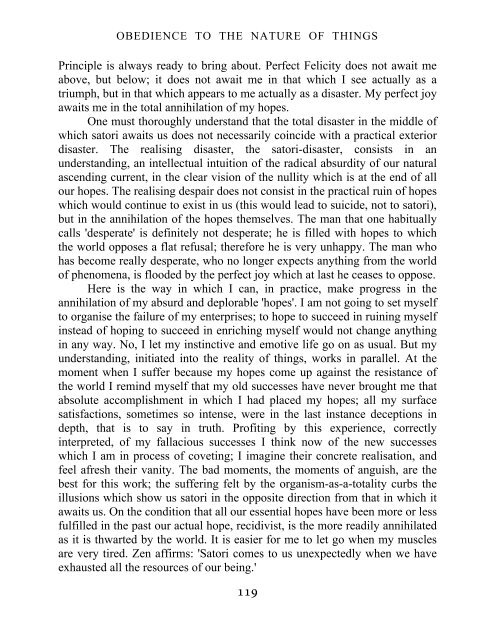The Supreme Doctrine - neo-alchemist
The Supreme Doctrine - neo-alchemist
The Supreme Doctrine - neo-alchemist
You also want an ePaper? Increase the reach of your titles
YUMPU automatically turns print PDFs into web optimized ePapers that Google loves.
OBEDIENCE TO THE NATURE OF THINGS<br />
Principle is always ready to bring about. Perfect Felicity does not await me<br />
above, but below; it does not await me in that which I see actually as a<br />
triumph, but in that which appears to me actually as a disaster. My perfect joy<br />
awaits me in the total annihilation of my hopes.<br />
One must thoroughly understand that the total disaster in the middle of<br />
which satori awaits us does not necessarily coincide with a practical exterior<br />
disaster. <strong>The</strong> realising disaster, the satori-disaster, consists in an<br />
understanding, an intellectual intuition of the radical absurdity of our natural<br />
ascending current, in the clear vision of the nullity which is at the end of all<br />
our hopes. <strong>The</strong> realising despair does not consist in the practical ruin of hopes<br />
which would continue to exist in us (this would lead to suicide, not to satori),<br />
but in the annihilation of the hopes themselves. <strong>The</strong> man that one habitually<br />
calls 'desperate' is definitely not desperate; he is filled with hopes to which<br />
the world opposes a flat refusal; therefore he is very unhappy. <strong>The</strong> man who<br />
has become really desperate, who no longer expects anything from the world<br />
of phenomena, is flooded by the perfect joy which at last he ceases to oppose.<br />
Here is the way in which I can, in practice, make progress in the<br />
annihilation of my absurd and deplorable 'hopes'. I am not going to set myself<br />
to organise the failure of my enterprises; to hope to succeed in ruining myself<br />
instead of hoping to succeed in enriching myself would not change anything<br />
in any way. No, I let my instinctive and emotive life go on as usual. But my<br />
understanding, initiated into the reality of things, works in parallel. At the<br />
moment when I suffer because my hopes come up against the resistance of<br />
the world I remind myself that my old successes have never brought me that<br />
absolute accomplishment in which I had placed my hopes; all my surface<br />
satisfactions, sometimes so intense, were in the last instance deceptions in<br />
depth, that is to say in truth. Profiting by this experience, correctly<br />
interpreted, of my fallacious successes I think now of the new successes<br />
which I am in process of coveting; I imagine their concrete realisation, and<br />
feel afresh their vanity. <strong>The</strong> bad moments, the moments of anguish, are the<br />
best for this work; the suffering felt by the organism-as-a-totality curbs the<br />
illusions which show us satori in the opposite direction from that in which it<br />
awaits us. On the condition that all our essential hopes have been more or less<br />
fulfilled in the past our actual hope, recidivist, is the more readily annihilated<br />
as it is thwarted by the world. It is easier for me to let go when my muscles<br />
are very tired. Zen affirms: 'Satori comes to us unexpectedly when we have<br />
exhausted all the resources of our being.'<br />
119




